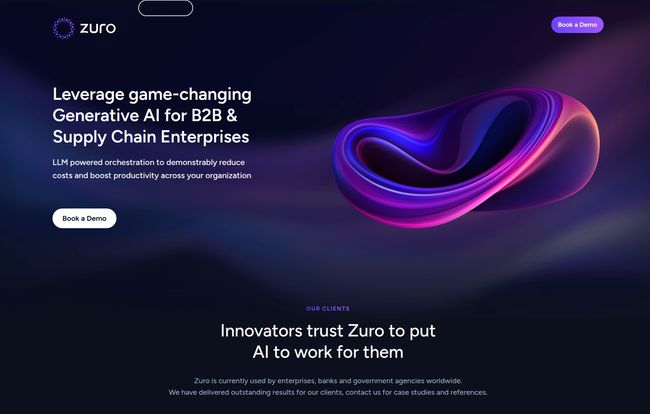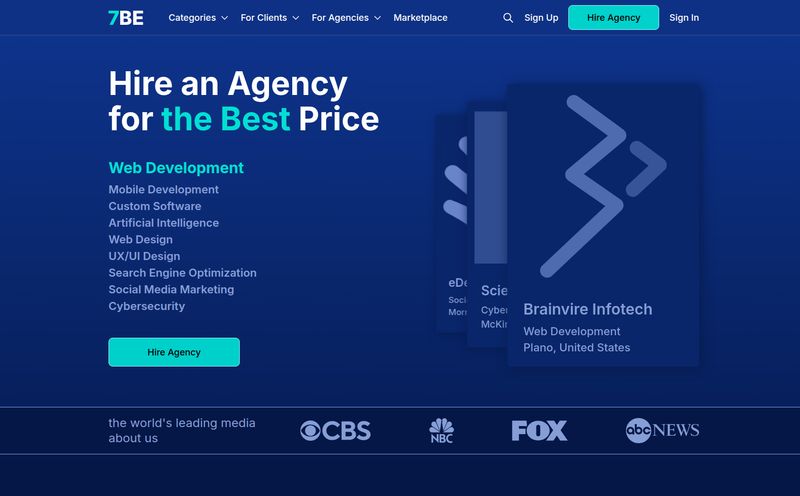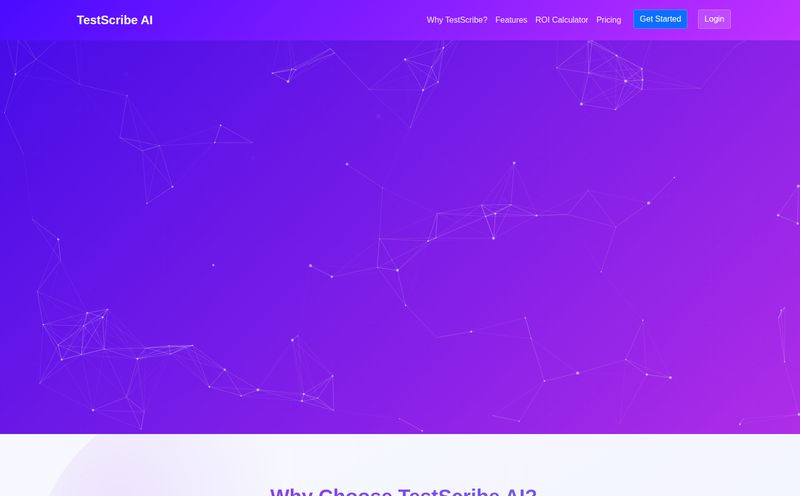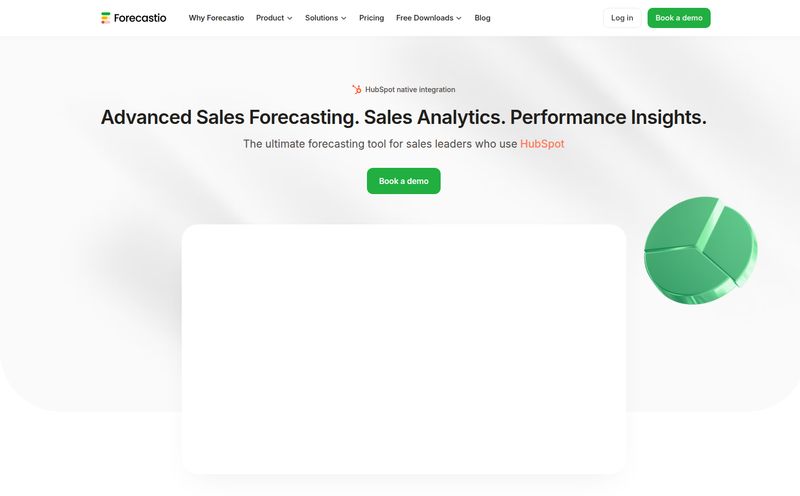For the past couple of years, my inbox and social feeds have been absolutely flooded with pitches for “game-changing AI.” Everyone and their dog has a new AI tool that promises to revolutionize, well, everything. As someone who has been in the SEO and traffic generation game for years, I've learned to develop a pretty thick skin. Most of it is just marketing fluff wrapped around a basic API call.
But every now and then, something catches my eye. Something that seems to understand the actual problem. The messy, complicated, soul-crushing problems that big businesses face. I’m talking about the chaos of modern supply chains, the data stuck in a dozen different silos, and the endless meetings trying to get the sales team to talk to the logistics team.
That’s where Zuro popped up on my radar. It’s not just another AI chatbot. They call themselves a “Generative AI for B2B & Supply Chain Enterprises,” focused on orchestration. And that word, orchestration, is what got my attention. It’s not about just having a smart tool; it's about making all your existing tools and teams work together, conducted by a single, intelligent maestro. But does it live up to the hype?

Visit Zuro Enterprise
So, What Exactly is Zuro Enterprise?
Imagine your company’s operations as a massive, sprawling orchestra. You’ve got the brass section (logistics), the strings (sales), the percussion (manufacturing), and the woodwinds (customer service). They all have their own sheet music (data) and are playing as best they can. The result? Often, it’s just noise. A cacophony of missed deadlines and bloated costs.
Zuro positions itself as the conductor. It doesn't try to replace your instruments or your players. Instead, it uses LLM-powered orchestration to get everyone playing from the same sheet music, in perfect harmony. In less metaphorical terms, it’s an end-to-end platform that embeds AI into your daily workflows. It connects to your existing data sources—the good, the bad, and the ugly—and uses it to automate processes, generate reports, and provide insights that actually help people do their jobs better. Its a powerful proposition for enterprises, banks, and even government agencies that are swimming in data but starving for wisdom.
Breaking Down The Zuro Advantage
Okay, the conductor analogy is nice, but let's talk specifics. What makes this platform different from the hundreds of other B2B AI solutions out there? From my analysis of their platform, it boils down to a few core strengths.
It Works With Your Actual Data
This is huge. So many AI tools require you to perfectly clean and structure your data before you can even get started. It's a massive, expensive project that can take months. Zuro claims to process both unstructured and structured data from wherever it lives. Emails, support tickets, spreadsheets, database entries... it's built to ingest the mess and make sense of it. This isn't just a feature; it's an understanding of how real businesses operate.
Speed That Actually Moves The Needle
I almost rolled my eyes when I read “Proven results in weeks, not years.” We’ve all heard that one before, right? But looking at their model, it starts to make sense. Because they’re using your existing data and infrastructure, the ramp-up time is drastically reduced. They boast about ingesting terabytes of data and deploying performant models quickly. For any COO or CTO, seeing a tangible ROI in weeks from a major tech implementation is the holy grail. It moves the conversation from a massive capital expenditure to a clear, operational win.
Real Solutions, Not Just Tech for Tech's Sake
What I find really interesting is the focus on end-to-end workflows. Zuro isn't just a dashboard you look at. It's designed to be embedded within the tools your team already uses. It bridges the gaps between departments, bringing stakeholders from across the organization into the same automated process. This is less about artificial intelligence and more about organizational intelligence. It solves human problems, like communication breakdowns and information silos, which are often the root cause of inefficiency.
Plays Nicely With Others: The Integration List
A platform is only as good as its ability to connect with your stack. Zuro seems to get this. Their list of 100+ smart data connectors is impressive and shows they're serious about fitting into complex ecosystems. We're not talking about a handful of obscure integrations; we're talking about the big guns:
You’ve got your cloud providers like AWS, Azure, and Google Cloud. You have data and BI tools like Snowflake and Power BI. CRMs and support systems like HubSpot and Zendesk. And collaboration tools like MS Teams. They even have Zapier in there, which opens up a whole other universe of connectivity. This isn’t a walled garden; it’s a command center.
Putting Zuro to Work: What Can It Do?
Alright, so it connects to everything and it's smart. But what are the “out of the box wins”? Based on their site, the applications are practical and hit on major B2B and supply chain pain points.
- Demand Forecasting & Inventory Optimization: This is a classic supply chain nightmare. Zuro uses historical data, real-time signals, and market trends to create more accurate demand forecasts. This means less capital tied up in excess inventory and fewer stock-outs that kill sales.
- Supply Chain Visibility & Risk Management: It proactively monitors your supply chain for potential disruptions, from supplier delays to shipping bottlenecks. Getting an early warning about a problem is the difference between a minor headache and a full-blown crisis.
- Integrated Support & Customer Service: By orchestrating LLMs, Zuro can help automate responses to common internal and external support queries, freeing up your human agents to handle the really complex issues. Better, faster service without hiring more people.
The Million-Dollar Question: What About Pricing?
And now for the part of the review everyone scrolls down to find first. How much does Zuro cost? Well, you won't find a pricing page on their website. And honestly, that’s not a red flag to me. For enterprise-grade software like this, “one size fits all” pricing just doesn't work.
The cost will depend entirely on the scale of your operation, the complexity of your data, the specific workflows you want to implement, and the deployment model you choose (SaaS, on-premise, etc.). This is a “get on a call and get a custom quote” situation. It signals that they’re selling a solution, not just a product. It’s for serious players who understand that the investment is tied to a specific, measurable ROI.
Are There Any Downsides?
No tool is perfect, and it's important to go in with your eyes open. Based on the technical details, there are a few things to consider. Zuro works with your existing data, but that implies you need a reasonably sound data infrastructure to begin with. It's not magic; it still needs data to work its magic on. Also, while it offers out-of-the-box solutions, deep, unique business challenges will likely require some level of customization. Finally, if you're running on ancient, creaking legacy systems, integration could be more complex. These aren't cons so much as realities of any major enterprise implementation.
My Final Take: Is Zuro Worth a Look?
After digging in, I'm genuinely intrigued. In a world of AI hype, Zuro seems refreshingly grounded in solving real, expensive business problems. The focus on orchestration over just creating another isolated AI tool is, in my opinion, the right approach. They understand that the goal is not to have the smartest AI, but to have the smartest organization.
Their final pitch on the website is a zinger: "Artificial intelligence cannot disrupt your business. Other companies with people using AI most certainly will." It's a bold, slightly threatening, and probably true statement. Tools like Zuro aren't just a competitive advantage anymore; they're becoming the price of admission to stay competitive.
If you're a leader in a B2B or supply chain enterprise and you're tired of hearing about the potential of AI and want to see actual results, then yes, Zuro is absolutely worth a discovery call. Just make sure your own servers are running smoothly when you do... we've all seen a Cloudflare 522 error pop up at teh worst times, right? Shows that even the tech wizards have their days.
Frequently Asked Questions About Zuro
What kind of businesses is Zuro best for?
Zuro is designed for medium to large B2B and Supply Chain enterprises, including banks and government agencies. It's for organizations that have complex operations and multiple data sources that need to be managed and optimized.
How long does it take to see results with Zuro?
One of Zuro's main selling points is speed to value. They claim that businesses can see a demonstrable return on investment (ROI) in weeks, rather than the years typically associated with large enterprise software deployments.
Is Zuro a secure platform?
Yes, they take security very seriously. The website mentions compliance and certifications including SOC 2 and GDPR, which are critical standards for handling sensitive enterprise data.
Can Zuro integrate with my company's current software?
Almost certainly. Zuro features over 100 smart data connectors for major platforms like AWS, Azure, HubSpot, Zendesk, Snowflake, and many more. Its core design is built around integrating with your existing tech stack.
Does Zuro replace my existing data team or analysts?
No, Zuro is designed to augment your team, not replace them. It automates repetitive data consolidation and reporting tasks, freeing up your skilled analysts to focus on higher-value strategic work that requires human insight and expertise.



